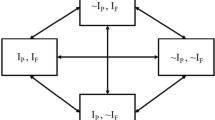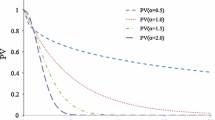Abstract
The behavior of individuals currently living will generally have long-term consequences that affect the well-being of those who will come to live in the future. Intergenerational interdependencies of this nature raise difficult moral issues because only the current generation is in a position to decide on actions that will determine the nature of the world in which future generations will live. Although most are willing to attach some weight to the interests of future generations, many would argue that it is not necessary to treat these interests as equivalent to those of the current generation. A common approach in this context is to use a system of discounting to evaluate future benefits and harms. This paper assesses the logic of discounting drawing on the writings of economists and philosophers. Much of the economic literature concerns the choice of an appropriate social discount rate. The social discount rate can be taken to reflect beliefs about the rights of future generations, a subject that has been extensively debated in the phioosophic literature. The writings of both economists and philosophers concerned with the weight to attach to the interests of future generations are reviewed and evaluated in this paper and the implications for environmental policy are discussed.
Similar content being viewed by others
References
Avineri, Schlomo, and Avner de-Shalit. 1992.Communitarianism and Individualism. New York, NY: Oxford University Press.
Baier, Annette. 1981. The Rights of Past and Future Persons. In:Responsibilities to Future Generations, edited by Ernest Partridge. Buffalo, NY: Promethus Books.
—. 1984. For the Sake of Future Generations. In:Earthbound, edited by Tom Regan, Philadelphia, PA: Temple University Press.
Barry, Brian. 1983. Intergenerational Justice in Energy Policy. In:Energy and the Future, edited by Douglas MacLean and Peter G. Brown. Totowa, NJ: Rouman and Littlefield.
Baumol, William O. 1977. On the Discount Rate for Public Projects. In:Public Expenditure and Policy Analysis, edited by Robert H. Haveman and Julius Margolis. Chicago. IL: Rand McNally.
Bromley, Daniel W. 1989. Entitlements, Missing Markets, and Environmental Uncertainty.Journal of Environmental Ethics and Management 17: 181–194.
Brown, S. P. A. 1987. The Fairness of Discounting: A Majority Rule Approach.Public Choice 55: 215–226.
Callahan, Daniel. 1981. What Obligations Do We Have to Future Generations? In:Responsibilities to Future Generations, edited by Ernest Partridge. Buffalo, NY: Prometheus Books.
Cline, William. 1991. Estimating the Benefits of Greenhouse Warming Abatement. Washington, DC: Institute for International Economics.
Cousteau, Jean-Michel. 1992. Nauru: The Island Planet. Television broadcast by Cousteau Society, Inc. and TBS Productions, Inc.
DeGeorge, Richard T. 1981. The Environment, Rights and Future Generations. In:Responsibilities to Future Generations, edited by Ernest Partridge. Buffalo, NY: Prometheus Books.
Dietze, Gottfried. 1985.Liberalism Proper and Proper Liberalism. Baltimore, MD: Johns Hopkins University Press.
Feinberg, Joel. 1981. The Rights of Animals and Unborn Generations. In:Responsibilities to Future Generations, edited by Ernest Partridge. Buffalo, NY: Prometheus Books.
Ferejohn, John and Talbot Page. 1978. On the Foundations of Intertemporal Choice.American Journal of Agricultural Economics.
Freeman III, A. Mycrick. 1977. Equity, Efficiency and Discounting: The Reasons for Discounting Intergenerational Effects.Futures October.
Green, Ronald M. 1981. Intergenerational Distributive Justice and Environmental Responsibility. In:Responsibilities to Future Generations, edited by Ernest Partridge. Buffalo, NY: Prometheus Books.
Goodin, Robert E. 1988. What Is So Special About Our Fellow Countrymen?Ethics 98: 663–686.
Haakonssen, Knud. 1989.The Science of a Legislator: The Natural Jurisprudence of David Hume and Adam Smith. New York, NY: Cambridge University Press.
Hanser, Matthew. 1990. Harming Future People.Philosophy and Public Affairs 19 (1).
Hardin, Garrett. 1981. Who Cares for Posterity? In:Responsibilities to Future Generations, edited by Ernest Partridge. Buffalo, NY: Prometheus Books.
Hartshorne, Charles. 1981. The Ethics of Contributionsim. InResponsibilities to Future Generations, edited by Ernest Partridge. Buffalo, NY: Prometheus Books.
Heilbroner, Robert L. 1981. What has Posterity Ever Done for Me? In:Responsibilities to Future Generations, edited by Ernest Partridge. Buffalo, NY: Prometheus Books.
Herskovits, Melville J. 1967.Dahomey: An Ancient West African Kingdom. Vol. I. Evanston, IL: Northwestern University Press.
Hursthouse, Rosalind. 1991. Virtue Theory and Abortion.Philosophy and Public Affairs 20 (3): 223–246.
Kavka, Gregory. 1978. The Futurity Problem. In:Obligations to Future Generations edited by R. I. Sikora and Brian Barry. Philadelphia, PA: Temple University Press.
Macedo, Stephen. 1991.Liberal Virtues. New York, NY: Clarendon Press.
MacIntyre, Alasdair. 1981.After Virtue. South Bend, IN: Notre Dame Press.
Macklin, Ruth. 1981. Can Future Generations Correctly Be Said to Have Rights? InResponsibilities to Future Generations, edited by Ernest Partridge. Buffalo, NY: Prometheus Books.
Marglin, S. A. 1963. The Social Rate of Discount and the Optimal Rate of Investment.Quarterly Journal of Economics 77 (1): 95–111.
Norton, Bryan G. 1987. Environmental Ethics and the Rights of Future Generations.Environmental Ethics 4: 319–337.
Page, Talbot. 1983. Intergenerational Justice as Opportunity. In:Energy and the Future, edited by Douglas MacLean and Peter G. Brown. Totowa, NJ: Rowman and Littlefield.
Parfit, Derek, “Energy Policy and the Further Future: The Social Discount Rate.” inEnergy and the Future, edited by Douglas MacLean and Peter G. Brown, Rouman and Littlefield, Totowa, NJ, 1983.
Partridge, Ernest.Responsibilities to Future Generations. Prometheus Books, Buffalo, 1981.
Pletcher, Galen K. 1981. The Rights of Past and Future Persons. In:Responsibilities to Future Generations, edited by Ernest Partridge. Buffalo, NY: Prometheus Books.
Rawls, John. 1971.A theory of Justice. Cambridge, MA: Harvard University Press.
—. 1978. The Basic Structure as Subject. In:Values and Morals, edited by Alvin I. Goldman and Kim D. Jaegwon. Boston, MA: Reidel Publishing Co.
Schmid, A. Allan. 1987.Property, Power, and Public Choice, second edition. New York, NY: Praeger.
—. 1989.Benefit-Cost Analysis: A Political Economy Approach. Boulder, CO: Westview Press.
Schneewind, J.B. 1990. The Misfortunes of Virtue.Ethics 101: 42–63.
Scott Jr., Robert. 1978. Environmental Ethics and Obligations to Future Generations. In:Obligations to Future Generations, edited by R. I. Sikora and Brian Barry. Philadelphia, PA: Temple University Press.
Sen, Amartya K. 1984a. Approaches to the Choice of Discount Rates for Social Benefit-Cost Analysis. InResources, Values and Development. Cambridge MA: Harvard University Press.
—. 1984b. Ethical Issues in Income Distribution: National and International. In:Resources, Values and Development Cambridge MA: Harvard University Press.
—, and Bernard Williams (editors) 1982.Utilitarianism and Beyond. Cambridge, U.K.: Cambridge University Press.
Sikora, F. I. and Brian Barry. 1978.Obligations to Future Generations. Philadelphia, PA: Temple University Press.
Sugden, Robert and San Williams. 1978.The Principles of Practical Cost-Benefit Analysis. Oxford, U.K.: Oxford University Press.
Tenenbaum, Susan. 1989. Social Discounting: Retrieving the Civic Dimension.Economics and Philosophy 5 (1): 33–46.
Thompson, Thomas H. 1981. Are We Obligated to Future Others? In: Responsibilities to Future Generations, edited by Ernest Partridge. Buffalo, NY: Prometheus Books.
Tomasi, John. 1991. Individual Rights and Community Virtues.Ethics 101: 521–536.
Tullock, Gordon. 1964. The Social Rate of Discount and the Optimal Rate of Investment: Comment.Quarterly Journal of Economics 78 (2): 331–336.
Warr, Peter G. and Brian D. Wright. 1981. The Isolation Paradox and the Discount Rate for Benefit-Cost Analysis.Quarterly Journal of Economics XCVI (1): 129–146.
Williams, Mary B. 1978. Discounting Versus Maximum Sustainable Yield. In:Obligations to Future Generations edited by R. I. Sikora and Brian Barry. Philadelphia, PA: Temple University Press.
Author information
Authors and Affiliations
Rights and permissions
About this article
Cite this article
Wesley, E., Peterson, F. Time preference, the environment and the interests of future generations. J Agric Environ Ethics 6, 107–126 (1993). https://doi.org/10.1007/BF01965479
Issue Date:
DOI: https://doi.org/10.1007/BF01965479




